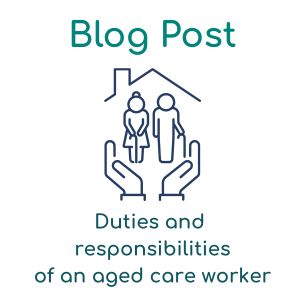
Duties and responsibilities of an aged care worker
First published: July 2024
Aged care workers working in the Australian aged care industry are responsible for more than just fundamental duties and responsibilities. They are expected to provide personal, emotional, and holistic support to their residents, playing a key part in a resident’s twilight years. Working in aged care is an admirable profession, one that is fully championed by the Australian government. The aged care reform roadmap includes implementation dates for reforms that aim to improve the rewards received by and retention of aged care workers across the country.
Current workforce shortages sit at around 110,000, so there is an abundance of aged care worker job openings for nationals and those who want to work as an aged care nurse in Australia from overseas. Certain personality traits, skills and tendencies are required to succeed in this industry, but the duties and responsibilities of an aged care worker will vary depending on your specific role.
What is an aged care worker?
Aged care workers are also known as assistant in nursing/personal care workers. Their role is very versatile, and some caregivers work in settings outside of residential aged care. They can transfer their skills over to the hospital/acute settings, home care and medical centres. The position description will vary slightly between environments, but the essential duties and responsibilities will stay the same.
Becoming an aged care worker is usually done through the study of a relevant certificate. These qualifications will be a Cert III/IV in:
- Individual Support (Ageing)
- Health Services Assistance
- Ageing Support
- Allied Health Assistance
These can be taken on a full-time, part-time, and self-paced basis. Not all aged care journeys start with this, however. You can work in aged care without a certificate, and kickstart your career through traineeships/apprenticeships and volunteering opportunities.
Aged care worker duties, responsibilities and individual roles
The duties and responsibilities of an aged care worker encompass:
Personal care
- Physical mobility – assisting with walking, using a hoist to transfer residents from one place to another.
- Hygiene – helping residents to bathe and shower, and oral care.
- Toileting.
- Grooming, which involves hair, skin and nail care.
- Assisting with meal rounds and feeding.
Emotional support
Your duties and responsibilities cover clinical and non-clinical care. Communicating with residents and their families on topics such as:
- Informing their families about their wellbeing.
- Offering companionship – chatting about their day, reminiscing about their lives, and keeping their social needs satisfied.
- Participating in leisure and lifestyle activities for the purpose of keeping them entertained and cognitively engaged.
Your role as an aged care worker is holistic. You provide care that is centered around the person as a whole, addressing all of their needs.
If you upskill to the role of an enrolled or registered nurse, or a medication competent aged care worker you will be given the duty of administering medications. As you progress your clinical knowledge and skills, your involvement in a resident’s medical care will increase.
One of our wonderful AINS, Parminder, recently came in to our HQ to discuss her experience working through Sanctuary. View the full video on our Youtube Channel.
Prepare for an aged care interview
Once you decide to embark on a career in the aged care industry, you need to get ready for the interview stage. The first step is to create or enhance your aged care resume. This will detail:
- A personal statement – this should include a brief summary of yourself, your experience and what you are looking for.
- Your qualifications – any relevant certificates or degrees you have obtained that would aid you in this role. If you do not have any of these yet, you can include school results or qualifications you are currently studying.
- Your experience – any paid work experience you have, whether it is in the industry or not, can show skills and work ethic. Detail what you have done in each of these roles as it may be relevant to the job you are applying for. If you do not have paid experience yet, state that in your personal summary, or include volunteering/unpaid experience if you have it.
- Your skills – state each skill and use evidence to back them up.
- Have references ready, but there is no need to detail them on the resume.
Follow our aged care resume building guide and get prepared with the top 12 aged care interview questions that you will commonly get asked.
The future of aged care workers
The aged care industry is an everchanging landscape. Developments are happening on an ongoing basis that are to benefit those who are part of the sector. High quality resident care is at the heart of the goals and objectives of the Department of Health and Aged Care, with workforce retention a key factor to reaching this.
Aged care workers in Australia have already received a 15% pay rise, with further increases to come. There are incentives for overseas aged care workers to move to Australia, including more long term and permanent pathways for these individuals to live and work in Australia. The PALM scheme, an organisation we are partnering with, is a government funded program giving those from the 9 Pacific Island nations and Timor Leste an opportunity to commit to a four-year work placement in rural and regional Australia. The options for aged care workers in the Australia market are endless.
Taking your aged care career to the next level
For an in-depth discussion with our industry experts on what it is like to work as an aged care worker in Australia, contact us today


